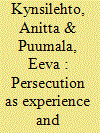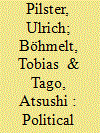|
|
|
Sort Order |
|
|
|
Items / Page
|
|
|
|
|
|
|
| Srl | Item |
| 1 |
ID:
145723


|
|
|
|
|
| Summary/Abstract |
There is a lively debate in constructivism today regarding the constitutive and regulatory power of international norms. First-generation studies assume that when states support norms they have fully “internalized” normative ideals. However, the scholarship tends to privilege structure over agency and may not account well for changes in state policies that impact normative architectures. This study extends recent work on agentic constructivism and international law to develop a typology of “norm stewardship” and model of norm change. It conducts a plausibility probe of the new stewardship model by comparing case studies of US policies on exports of sensitive uranium enrichment and reprocessing (ENR) technologies. Case evidence suggests that variations in norm internalization and dissonant norm strains impact multilateral initiatives on nonproliferation. This study concludes with a discussion of wider implications of norm stewardship for theories of international cooperation.
|
|
|
|
|
|
|
|
|
|
|
|
|
|
|
|
| 2 |
ID:
145724


|
|
|
|
|
| Summary/Abstract |
This paper adopts an ontological perspective toward asylum interviews. The suggested take refers to the incompatibility of different knowledge systems and experienced worlds between asylum seekers and asylum officers. With such a focus, we sketch the parallel functioning of knowledge-claims anchored in two radically different ontological principles. Our analysis starts with the body as a site and source of knowledge through which we critically examine the limits of knowledge sought after in asylum politics. The ontological gap reflects the divide between meaning and significance, self and other, which this paper seeks to mediate through feminist methodologies and ethnographic insight. We suggest that asylum seekers do fill the ontological gap, but not in ways anticipated by governmental practices; their bodies and stories adopt alternative ways of identification and taking action. Thus, the gap is an opening for conceiving different knowledges and knowledge practices within asylum politics and international relations.
|
|
|
|
|
|
|
|
|
|
|
|
|
|
|
|
| 3 |
ID:
145725


|
|
|
|
|
| Summary/Abstract |
Several studies have claimed that changes in the political leadership of a country affect foreign policy decision making. The following paper systematically tests this in the context of states' participation in military coalition operations. By building on previous theoretical models, the authors argue that new leaders may differ from their predecessors in that the former (i) have dissimilar preferences with regard to the involvement in military interventions, (ii) evaluate relevant information differently, and (iii) are less likely to be entrapped in intervention policies. Ultimately, the net effect of these factors should make it more likely that political leadership turnovers are associated with premature withdrawals from ongoing military coalitions. The theory is tested by quantitative analyses of newly collected data on military coalition operations in 1946–2001 and a qualitative case study. The authors find strong and robust support for their argument.
|
|
|
|
|
|
|
|
|
|
|
|
|
|
|
|
| 4 |
ID:
145722


|
|
|
|
|
| Summary/Abstract |
With its roots in the “war on drugs” and the criminalization of money laundering, the global initiative to combat the financing of terrorism (CFT) provides one strategy for preventing and preempting terrorist attacks. In public pronouncements, terrorist finance was named the “lifeblood” and “oxygen” for terrorism itself, thus displaying an analogy suggesting that its mere removal could bring an end to terrorism. Following the theoretical perspective of the Copenhagen School of security studies, this paper argues that national and international measures against terrorist finance constitute the “securitization” of money. By situating money as the essential component to an existential threat, it was possible to justify extraordinary measures to monitor financial transactions. These measures produced unintended consequences prompting resistance and an evolution of procedures to reduce those consequences. This paper considers two affected areas (migrant remittances and financial inclusion) and points to the potential use of financial surveillance against grand corruption.
|
|
|
|
|
|
|
|
|
|
|
|
|
|
|
|
| 5 |
ID:
145720


|
|
|
|
|
| Summary/Abstract |
The Tsunami in South-East Asia in 2004 prompted the largest military disaster response in history. Encouraged by the success, increasing attention has been paid to the various humanitarian assistance and disaster relief activities conducted by US armed forces. Since 2006, the US Navy deploys one of its two large hospital ships in annual missions to either Central and South America or the Asia–Pacific region to provide people in need with free care. These missions offer many opportunities to increase the soft power capital of the United States by forging ties with host nation governments and improving the image of the United States within the local population. However, this article argues that we need more research on the impact of humanitarian assistance to justify a continuation in a fiscally constrained environment.
|
|
|
|
|
|
|
|
|
|
|
|
|
|
|
|
| 6 |
ID:
145726


|
|
|
|
|
| Summary/Abstract |
This paper concerns the growing importance of the executive to the foreign policies of Brazil and Venezuela. Exploring the implications of this trend, it examines the extent to which the concentration of power in the presidency—rather than its diffusion in institutions—facilitates the steering tasks of government in an interstate setting. It focuses on the issue of energy security—a theme integral to both states—so as to tell a larger story about the role of the executive in promoting cooperation in spite of the different policy trajectories pursued by the respective foreign ministries. It concludes that while the concentration of power is beneficial to the monitoring of and intervention into the cooperation process so as to push it forward, in the absence of a strong institutional backdrop, the longevity of such cooperation is likely to be limited.
|
|
|
|
|
|
|
|
|
|
|
|
|
|
|
|
| 7 |
ID:
145721


|
|
|
|
|
| Summary/Abstract |
The US troop surge and awakening movements are the two factors most often associated with the decrease of violence in Iraq after 2006. However, these policies, including a distinction between the Anbar Awakening and later Sons of Iraq (SOI) program, did not occur simultaneously. To date, it also has not been made clear whether the surge, Anbar Awakening, and/or SOI deserve credit as the intervention responsible for improving security conditions in Iraq. Hence, we compare the relative effects of these three interventions using Poisson autoregression models for interrupted time series to assess which policy reduced civilian and Coalition troop casualties in Iraq between 2004 and 2011. We find clear evidence that the non-Anbar SOI rather than the troop surge reduced casualty rates in Iraq, though this effect distinction has not been made salient in policy circles, where the conventional wisdom of a combined effect for the surge and awakening councils persists. Given this, the same kind of “surge and local militia allies” strategy held significant appeal for NATO strategists in Afghanistan. Yet for reasons we consider in the second portion of this article, a number of more challenging factors bedeviled counterinsurgency there.
|
|
|
|
|
|
|
|
|
|
|
|
|
|
|
|
|
|
|
|
|